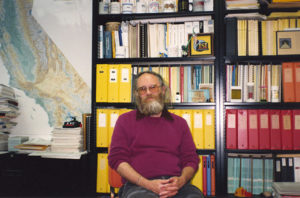
Date: 01/01/1998Jonathan Bruce Postel made many significant contributions to the creation of the Internet, particularly in the area of standards. The Economist dubbed him the “God” of the Internet, and many still refer to him as the network’s principal founder. He is largely known for being the Editor of the RFC document series, and for managing the creation and allocation of Top Level Domains and IP addresses in the pre-ICANN era. When he passed away he was the Director of the University of Southern California’s Information Sciences Institute’s Computer Network Division; he led a staff of 70. He pioneered many initiatives, which led to creation of the modern Internet and its governing body, ICANN; he established IANA, ICANN’s precursor and the current Internet numbering authority.
Jon Postel’s technical influence can be seen at the very heart of many of the protocols which make the Internet work: TCP/IP determines the way data is moved through a network; SMTP allows us to send emails; and DNS, the Domain Name Service, helps people make sense of the Internet. He contributed to these and many other technologies. He studied at UCLA, ultimately gaining his Ph.D. in computer science in 1974. Those studies led to his early involvement in the ARPANET project, the packet switching network from which the modern Internet evolved.
In addition, he was involved with Request For Comment (RFC) document series, which contains the standards and practices of the Internet’s infrastructure. For almost three decades, Jon Postel was RFC Editor, shepherding drafts through the open consensus processes that characterize Internet development efforts.
For many, Jon’s greatest contribution to the Internet was his role in creating the Internet Assigned Numbers Authority (IANA). This task – which he volunteered to take on and which he at first performed manually – provided the stability the Internet’s numbering and protocol management systems needed for it to grow and scale. He was also involved with the Los Nettos network (a regional network for the greater Los Angeles area) and was one of Internet Society’s founders, the first individual member; and he served as a Trustee from 1993-98.
Jon voluntarily took on the task of founding and running IANA, the Internet’s necessary numbering authority. He initially performed all numbering procedures and allocations manually. Thus, in Vint Cerf’s words, he kept track of the names of all things in the networked universe.[16] IANA sprung from the expansion of the ARPANET, and the vision of breaking messages into packets, each carrying an address, and sending them over a network to find their own way to another computer; the packets would then be reassembled into the original message. For this system to function each computer would have to have an individual address that would both be intelligible and constant; Jon invented this numbering address scheme. His system also allowed the numbers that computers used for addresses to be translated into English, and thus servers could be accessed by going to a site; i.e. www.example.com, instead of typing in something like 124.345.253.196. As the early network was quite small, Jon initially kept track of all of the existent addresses on scraps of paper. As the network grew, a more formal organization was needed; and the USC’s ISI was contracted by the U.S. government to manage the address system, Jon Postel was the founder and director. Thus, Jon was influential in establishing the protocols of the DNS, the roles of registries and registrars, and all necessary technical standards.
He died October 16, 1998 at the age of 55.